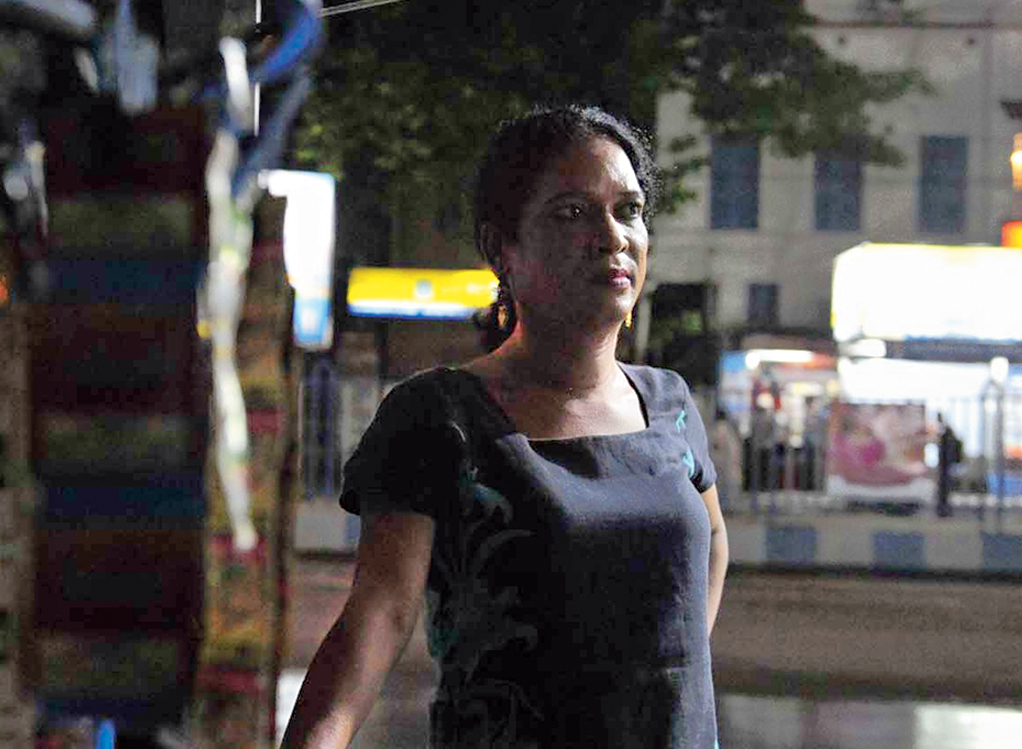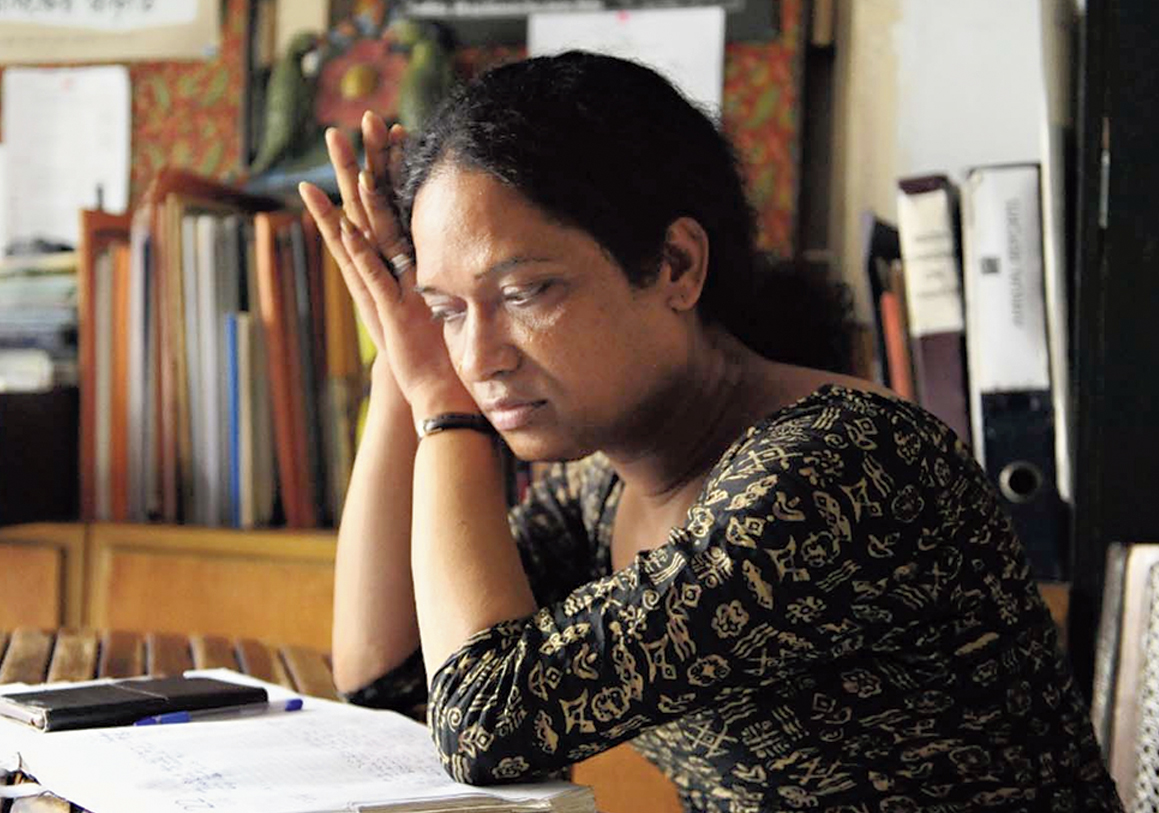
Julie at her cigarette stall.
Julie was not the name she was born with. It was the name of her twin sister. She was born Sibesh Saha, the youngest of six siblings, a boy, the first male child in the family.
Much hope rested on her in their small Manoharpukur Road house. The family was happy with a son born at last. The name Sibesh implied blessings of Lord Shiva; the twin sister, the original Julie, was named more casually. Their father was a driver at a catering service in south Calcutta. He worked hard to look after his large family.
“But very early in life I knew I was not what I was,” says Julie, 43. She looks intent as she speaks, her face serious, and a little careworn. She is wearing a plain kurti and a salwar. Her only ornament is a nose ring: this is her workday look.
From 9.30am to 6pm every day, sometimes for longer, she works at Pratyay Gender Trust and Sanhita, sister organisations that work on sexual harassment at the workplace and transgender rights, respectively.
Julie is an office assistant and a trusted employee. At the office, she moves from job to job in a brisk, business-like manner, the way she speaks. Otherwise she is out, travelling by bus, auto or taxi, delivering letters from her office to various addresses.
“By 12 or so, I had realised that I was not like other boys,” says Julie.
The result was a rough childhood. Her eldest sister, a pillar for the family, worked tirelessly to make a man of her brother. “She used to soak chickpeas in water overnight for me to make me physically stronger and manly,” says Julie.
Her father’s method to “straighten” her was more drastic. He threatened to commit suicide because of Julie, who would be teased as “boudi” in her neighbourhood as she was effeminate. “Why didn’t you pull down your pants and show them?” her father would ask. His only son was failing him.
Everyone in the family except her twin sister would try force her into being a boy.
At home, Julie once thought of throwing on herself a boiling pot of milk.
“You can call me a ‘koti’. ‘Koti’ is the word in our community for an effeminate man, not to be confused with ‘hijra’, which is a profession,” says Julie. “Or you can call me a ‘prantik purish’, or ‘transgendered’, or ‘rupantarkami’.” Then she smiles.
“Actually it doesn’t matter. As long as you don’t call me a man.”
Julie is now Sibesh only in the official documents.
“The one thing that I will not be called is a man,” she says with calmness and dignity.
Julie has always worked hard.
After studying at South Suburban Branch school in Lansdowne Road, she took up philosophy honours at the evening session of Syama Prasad College in the early 1990s. She was working during the day at a financial company, for Rs 500 a month. She did not finish college.
She had stepped into the bread-earner’s role.
“I still used to wear men’s clothes, shirts and trousers, and feel very uncomfortable,” says Julie. Then the company went bust.
Julie began giving private tuitions, at home and also at students’ homes. “I could teach all subjects till Class VIII, and Bengali in the higher classes,” she says.
She still gives tuition on weekends.
Her world expanded. “I had hardly met anyone like me before. But I began to meet others like me,” she says. This was the mid-90s.
A deep transformation began within her. Her clothes became its statement.
By now, she was the major contributor to the family, and this allowed her freedom. “Money is everything,” she says.
Two moments were of great importance: one, the discovery of “panstick” make-up, which allowed her to smoothen the roughness of her facial skin; two, the fact that she began to wear a bra.
Julie does not want sex-reconstruction surgery. She just wants to look like a woman. “I am a woman,” she says.
“I also began to wear short dresses. If I couldn’t afford one, I just wore the kurti,” she says, smiling.
“I would go to the Lake stadium to meet men. As I sashayed along in my short dresses, the men used to call me ‘Julie’, as in the film ‘Julie’ where the heroine wears short dresses.” The name stuck on, making her twin’s name seem more than a coincidence.
Now Julie works at the NGOs in the morning and runs a roadside cigarette stall at night in Rashbehari Avenue, on the Deshapriya Park pavement facing the sari shops.
She got the idea from a friend, who runs a chow mein stall a few feet away, about 10 years ago. A relative of one of her students lent her Rs 2,000.
She opens the stall, a small tin-and-iron structure, painted in the government blue-and-white, around 8.30 in the evening. After office, she goes home to look after her mother, who is very ill now, and cannot make it earlier.
She also goes home to dress up.
As I reach Deshapriya Park on a sultry July evening around 9, I pass Julie without recognising her. She is pancaked brightly, and is wearing glittery earrings and a neckpiece — and a short dress.
She is sitting on a plastic stool in front of the stall, attending to customers, but she is not alone. Her stall is a kind of community centre, where transgendered people from the area come every day for after-work adda. They have to come every day.
For some coming here is also work, because they are sex workers and are approached by clients here.
Julie herself does sex work to supplement her income.
The night can bring trouble. The shopkeepers around them are friendly. But Julie and her friends stay on till late, for their adda, and they are the perpetual target of local goons and policemen, and sometimes it is difficult to tell the one from the other.
“We have never created trouble in the area. Let anyone say we have,” says Julie. “We have only tried to be of help.”
As Rashbehari Avenue becomes more and more desolate in the night, the darkness becomes more menacing. This could be an Almodovar night, except that his neon-cracked Madrid looks positively cheerful compared to the bleakness of late-night LED-lit south Calcutta that can assume the shape of raging youths on motorbikes or a police jeep any moment.
“But I always go back home by 12.30,” says Julie.
She has to look after her mother and be ready for work next morning. She has, in a way, stepped into her father’s role, too.
Her mother accepts Julie now. If someone still tries to talk Julie “into sense”, her mother intervenes. “Does anyone else look after me?” she asks.
Her mother has only one problem: Julie is not allowed to wear a sari, the final symbol of womanhood, in her presence. “My mother tells me, ‘I have given birth to you, my son. How can I know otherwise?’ ” Julie laughs.











